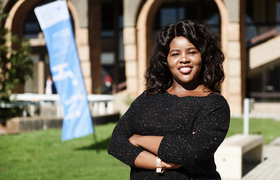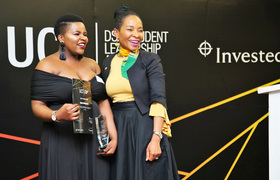Academics key to mental health interventions
14 June 2019 | Story Niémah Davids. Photo Brenton Geach. Read time 4 min.
The University of Cape Town’s student delegate to the recent Worldwide Universities Network (WUN) Conference in Ireland, Sarina Mpharalala, has returned from the event ready to help the institution unpack its pivotal challenges.
Tackling rising mental health problems – and the attached stigma – among university students globally took centre stage at the conference, she reported, saying she was “somewhat relieved” to learn that the challenge was far from unique to UCT.
Mpharalala attended last month’s event, a gathering of higher education institutions from around the world, after winning UCT’s 2018 Vice-Chancellor’s Award. This was the first time in the WUN’s 19-year existence that universities were permitted to include a student representative in their delegation.
“It was an unbelievable experience. I went there feeling overwhelmed – not knowing what to expect. But I returned feeling invigorated, and ready to help this university unpack pivotal challenges.”
The conference, she explained, provided a platform to openly discuss important issues such as mental health challenges among students, and to debate, benchmark and brainstorm solutions with both international peers and academics.
Destigmatising mental health
While there is no one-size-fits-all approach to this global concern, Mpharalala said step one starts with understanding the challenges, and talking openly and frankly about them.
“This is an important concept that needs to be unpacked in detail. We concurred that it affects everyone, but not in the same way.”
“We concluded that if we channel attention into understanding what mental health challenges really mean and how we can address the problem for the better, and for the benefit of students, we’d be good to go.”
She moderated a panel discussion during which, she said, a common picture had emerged of institutions failing to understand the fundamentals of mental health challenges, and how best to deal with them. Consequently, students were forced to bear the brunt of the situation.
“We concluded that if we channel our attention into understanding what mental health challenges really mean and how we can address the problem for the better, and for the benefit of students, we’d be good to go,” she said.
Engaging with academic staff and enabling them to identify the tell-tale signs of depression and other mental health conditions was also flagged as critical.
While student wellness has an important role to play, Mpharalala said the service is often introduced only once the problem has been identified and students have requested help.
“We agreed [that] we can’t rely solely on the wellness services on our campuses. We need the help of our lecturers, since they are with us in class for most of the day.
“They should be able to step in when they notice that something’s wrong, and should know exactly what to do. Universities have a responsibility to help get them there.”
Plans in the pipeline
Accountability is key, she added.
“We can have these conversations, but acting on them is what really counts.”
For now, Mpharalala – a final-year commerce student – is focused on wrapping up her exams. But in the pipeline is a report highlighting the challenges around mental health being experienced by UCT students.
Her report, which she plans to submit to Vice-Chancellor Professor Mamokgethi Phakeng via the institution’s Research Office, will also include suggestions and recommendations on how to move forward.
“We need to work towards implementing the solutions we have learnt. It won’t cost a lot. We simply need to draw on our resources to make it happen. At the end of the day, it will benefit all of us.”
 This work is licensed under a Creative Commons Attribution-NoDerivatives 4.0 International License.
This work is licensed under a Creative Commons Attribution-NoDerivatives 4.0 International License.
Please view the republishing articles page for more information.










